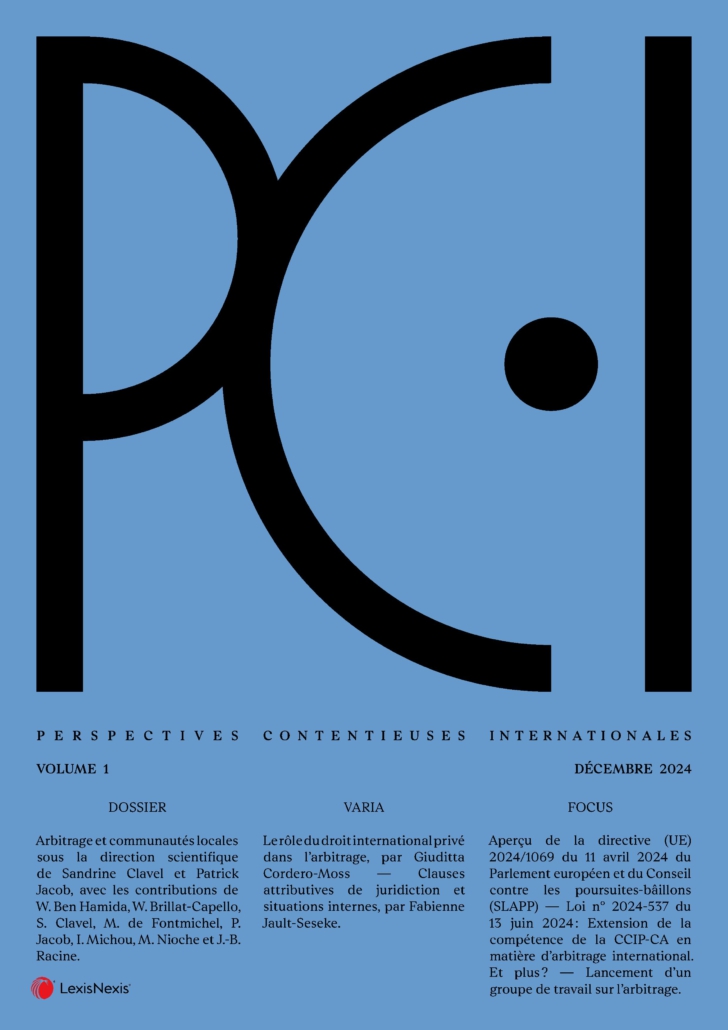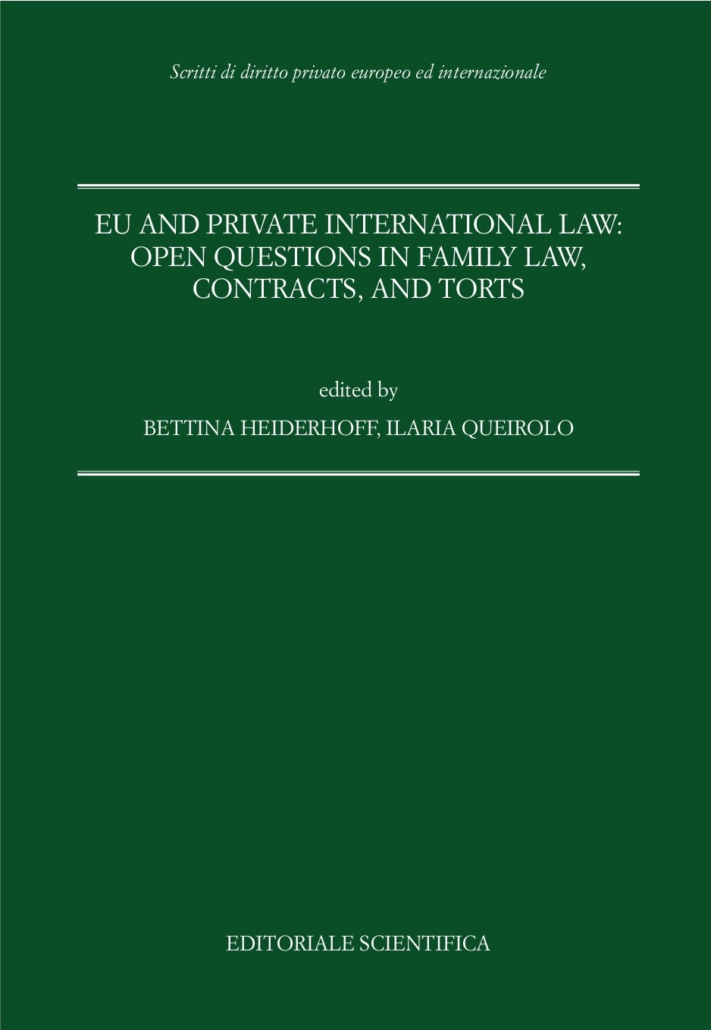Views
Trending Topics in German PIL 2024 (Part 1 – Illegal Gambling and “Volkswagen”)
At the end of each year I publish an article (in German) about the Conflict of Laws developments in Germany of the last twelve months, covering more or less the year 2024 and the last months of 2023. I thought it would be interesting for the readers of this blog to get an overview over those topics that seem to be most trending.
The article focuses on the following topics:
- Restitution of Money lost in Illegal Gambling
- Applicable Law in the Dieselgate litigation
- The (Non-)Valitidy of Online Marriages
- New German conflict-of-law rules regarding gender afiliation / identity
- Reforms in international name law
I will start in this post with the two first areas that are mainly dealing with questions of Rome I and Rome II while in my follow-up post I will focus on the three areas that are not harmonized by EU law (yet) and are mainly questions of family law.
Chinese Judicial Practice on Asymmetric Choice of Court Agreements in International Civil & Commercial Disputes
By Yuchen Li, a PhD student at Wuhan University.
A. Introduction
An asymmetric choice of court agreement is commonly used in international commercial transactions, especially in financial agreements, which usually allows one party (option holder) an optional choice about the forum in which proceedings may be brought but the other (non-option holder) an exclusive choice to sue in a designated court.[1] A typical example is as follows:
‘(A) The courts of England have exclusive jurisdiction to settle any disputes ….
(B) The Parties agree that the courts of England are the most appropriate and convenient courts … to settle Disputes and accordingly no Party will argue to the contrary.
(C) This Clause is for the benefit of the Finance Parties only. As a result, no Finance Party shall be prevented from taking proceedings relating to a Dispute in any other courts with jurisdiction. To the extent allowed by law, the Finance Parties may take concurrent proceedings in any number of jurisdictions.’ [2]
In recent years, issues concerning asymmetric choice of court agreements have been controversial in cases within some jurisdictions.[3] Despite the significant amount of research on asymmetric choice of court agreements, little attention has been paid to Chinese stance on this topic. With Chinese private parties actively engaging in international transactions, Chinese attitude towards such clauses is important for commercial parties and academic researchers. This article gives a glimpse of how Chinese courts handle asymmetric choice of court agreements in international and commercial civil litigations.[4] Read more
China’s New Civil Procedure Law and the Hague Choice of Court Convention: One Step Forward, Two Steps Back?
By Sophia Tang, Wuhan University
China’s New Civil Procedure Law adopted in 2023 and taking effect from 1 Jan 2024 introduces significant changes to the previous civil procedure law regarding cross-border litigation. One of the key changes pertains to choice of court agreements. In the past, Chinese law on choice of court agreements has been criticized for being outdated and inconsistent with international common practice, particularly because it requires choice of court clauses to be in writing and mandates that the chosen court must have “practical connections” with the dispute. After China signed the Hague Choice of Court Convention, there was hope that China might reform its domestic law to align with the Hague Convention’s terms and eventually ratify the Convention.
The New Civil Procedure Law retains the old provision on choice of court agreements, stating that parties can choose a court with practical connections to the dispute in writing (Article 35). This provision is included in the chapter dealing with jurisdiction in domestic cases, but traditionally, Chinese courts have applied the same requirements to choice of court clauses in cross-border cases.
News
New Journal: Perspectives contentieuses internationales (PCI)
The following announcement was kindly shared with us by Fabienne Jault-Seseke
Created with the support of LexisNexis, the Review Perspectives contentieuses internationales (PCI) is a biannual academic journal dedicated to the globalization of international litigation in both its public and private aspects. Each issue features a thematic dossier, complemented by several articles outside the main topic (Varia), as well as brief focus pieces addressing current events relevant to political or regulatory developments impacting international disputes (Focus).
The editorial committee, which ensures the scientific and operational direction of the Review, is composed of Sandrine Clavel, Patrick Jacob, and Fabienne Jault-Seseke (professors at Université Paris-Saclay, UVSQ).
Three issues have already been published and are available open access.
Out Now (Open Access): Heiderhoff/Queirolo (eds), EU and Private International Law: Oper Questions in Family Law, Contracts, and Torts
A new volume coming out of the Programme in European Private Law for Postgraduates (PEPP) has just been published as part of the Scritti di diritto privato europeo ed internazionale series.
The table of contents can be found here; the full volume is available open access here.
HCCH Monthly Update: July 2025
Conventions & Instruments
On 1 July 2025:
- The 2019 Judgments Convention entered into force for the United Kingdom. At present, 33 HCCH Members are either bound by the 2019 Judgments Convention or a Contracting Party for which the Convention has not entered into force yet (Albania, Andorra, and Montenegro). More information is available here.
- The 1996 Child Protection Convention entered into force for El Salvador. The Convention currently has 57 Contracting Parties. More information is available here.
- The 2007 Child Support Convention entered into force for Colombia. At present, 55 States and the European Union are bound by the 2007 Child Support Convention. More information is available here.
- The 2005 Choice of Court Convention entered into force for Bahrain. At present, 37 States and the European Union are bound by the 2005 Choice of Court Convention. More information is available here.
On 5 July 2025, the 1970 Evidence Convention entered into force for the Philippines. The Convention currently has 69 Contracting Parties. More information is available here.
On 24 July 2025, the Republic of Moldova acceded to the 1970 Evidence Convention. The Convention currently has 69 Contracting Parties. More information is available here.
Publications
On 22 July 2025, the Permanent Bureau announced the publication of the fifth editions of the Practical Handbooks on the Operation of the 1965 Service and 1970 Evidence Conventions. Incorporating recent developments, court decisions, and practical examples provided by experts from around the world, as well as updates from the meeting of the Special Commission held in July 2024, the fifth editions of the Handbooks are essential resources for anyone involved in the implementation and operation of the 1965 Service and 1970 Evidence Conventions. More information is available here.
Meetings & Events
On 10 July 2025, the Permanent Bureau of the HCCH and the Asian Business Law Institute co-hosted the webinar “Cross-border Commercial Dispute Resolution – Electronic Service of Documents and Remote Taking of Evidence”. More information is available here.
On 11 July 2025, the first meeting of the Working Group dedicated to the Model Forms for Chapter II of the 1970 Evidence Convention was held online, hosted by the Permanent Bureau. More information is available here.
Other Developments
On 9 July 2025, the premises of the HCCH’s Regional Office for Africa, hosted by the Kingdom of Morocco, were officially opened in Rabat. More information is available here.
On 10 July 2025, the Permanent Bureau of the HCCH announced several developments with regard to the HCCH’s International Child Abduction Database (INCADAT), including the launch of its new notification service. More information is available here.
These monthly updates are published by the Permanent Bureau of the Hague Conference on Private International Law (HCCH), providing an overview of the latest developments. More information and materials are available on the HCCH website.


